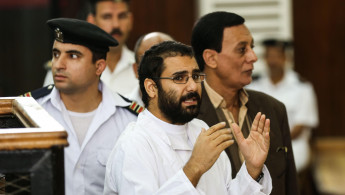Amnesty International urges Egypt to release activist Alaa Abdel-Fattah, detained for 1,000 days
Amnesty International has called for the release of prominent Egyptian activist Alaa Abdel-Fattah, who on Saturday marks 1,000 days of "unjust detention".
"Tomorrow marks 1,000 days of unjust detention for prominent blogger and activist Alaa Abdel Fattah, and his lawyer Mohammad Baker, both imprisoned solely for the peaceful exercise of their human rights," Amnesty said in a statement on Friday.
It urged Egypt to release the pair "immediately and unconditionally".
A key figure in the 2011 revolt that toppled longtime autocrat Hosni Mubarak, Abdel Fattah was sentenced in December to five years in prison after he was convicted along with two others of "broadcasting false news".
He had already been in pre-trial detention in Cairo's notorious Tora prison since September 2019, and has spent the better part of the past decade behind bars.
He has been on hunger strike since early April to protest his prison conditions, according to his family.
Amnesty urged the British authorities to "use all means at their disposal" to visit Abdel Fattah and "secure his release".
Abdel Fattah gained UK citizenship in April from inside prison, through his British-born mother Laila Soueif. His family has since been pushing for a consular visit.
Foreign Secretary Liz Truss said on Tuesday that Britain was "working very hard to secure his release" and that she was "seeking a meeting with the Egyptian foreign minister".
Amnesty's Middle East and North Africa deputy director Amna Guellali called Abdel Fattah "a symbol of resistance and freedom in Egypt and the wider region".
"His continued unjust imprisonment sends a chilling message to other activists, casting a shadow over preparations for the global UN climate conference taking place in Egypt later this year," she said.
Human rights groups say Egypt is holding a total of 60,000 political prisoners, many facing brutal conditions and overcrowded cells.
Egypt is set to host the COP27 climate summit in November, a role Human Rights Watch has said "rewards" President Abdel Fattah al-Sisi's "repressive rule".





 Follow the Middle East's top stories in English at The New Arab on Google News
Follow the Middle East's top stories in English at The New Arab on Google News


